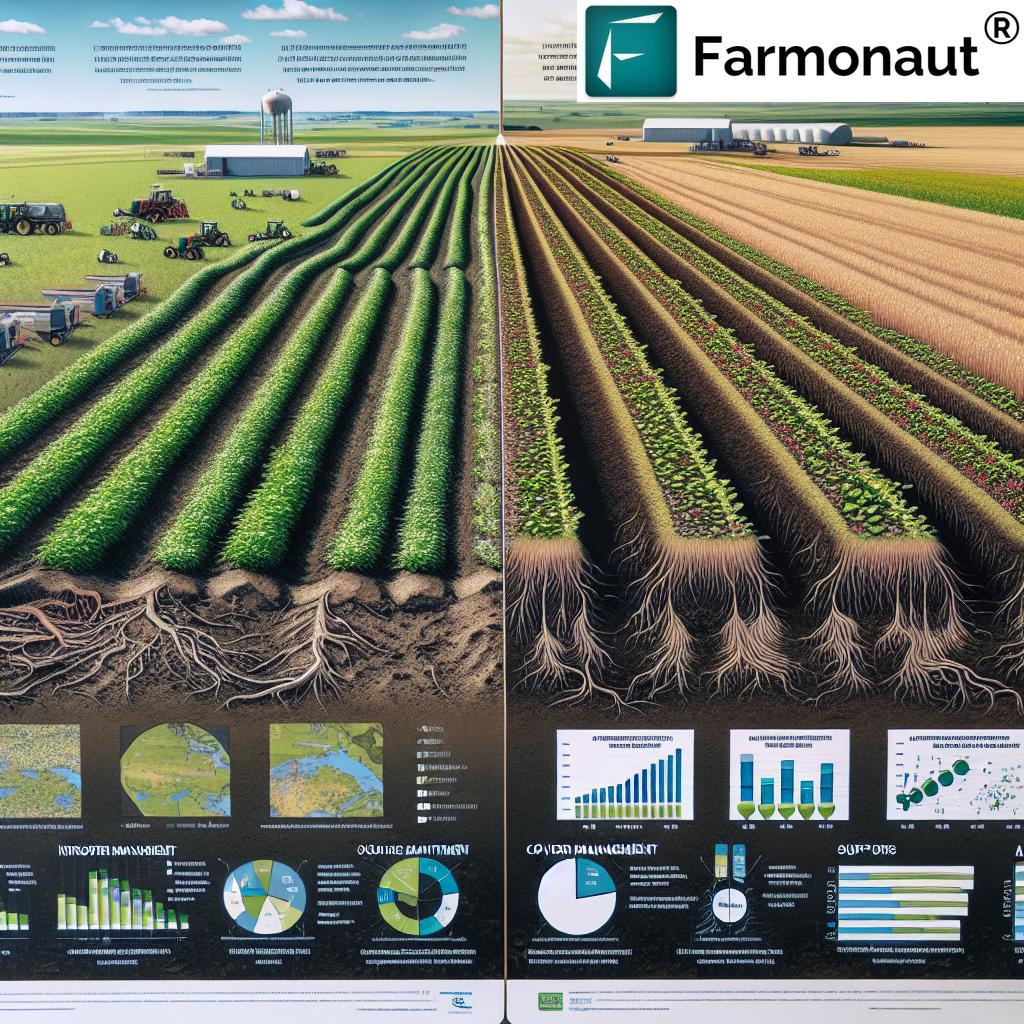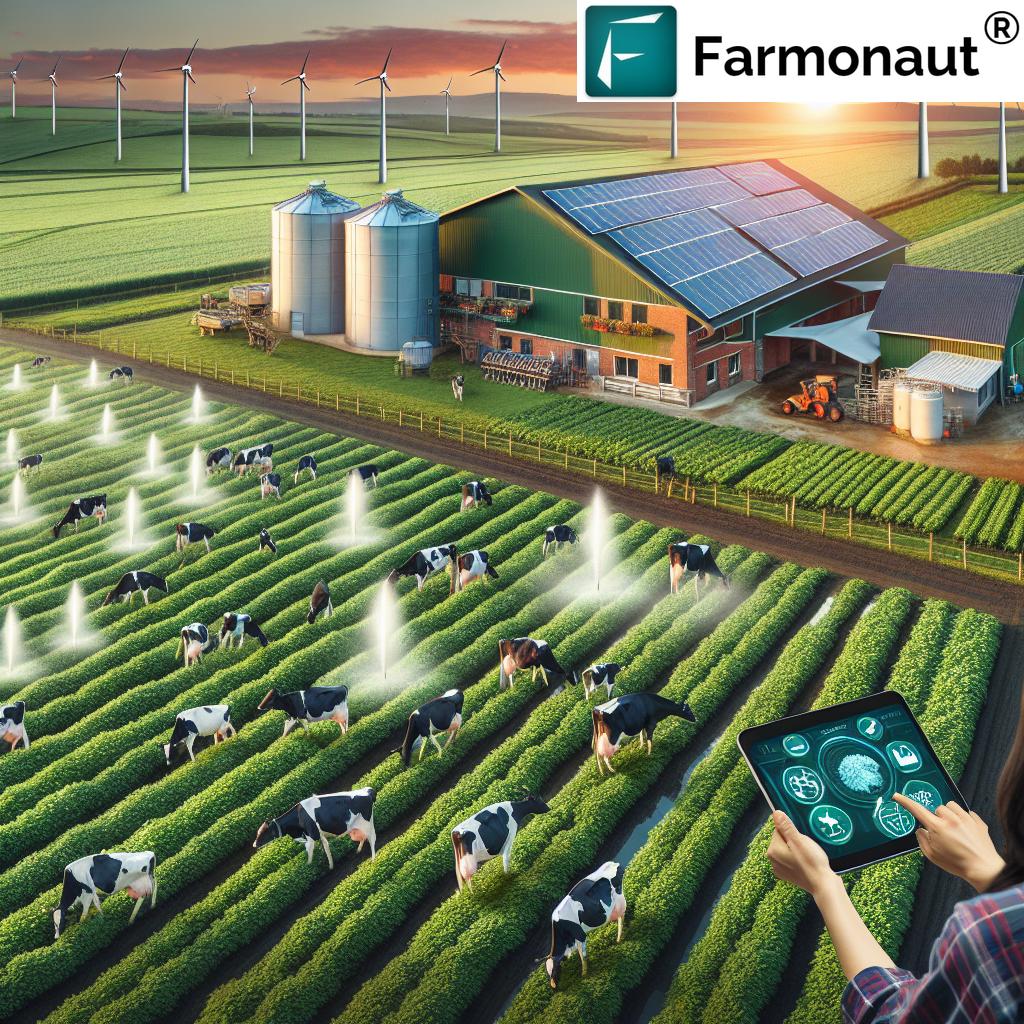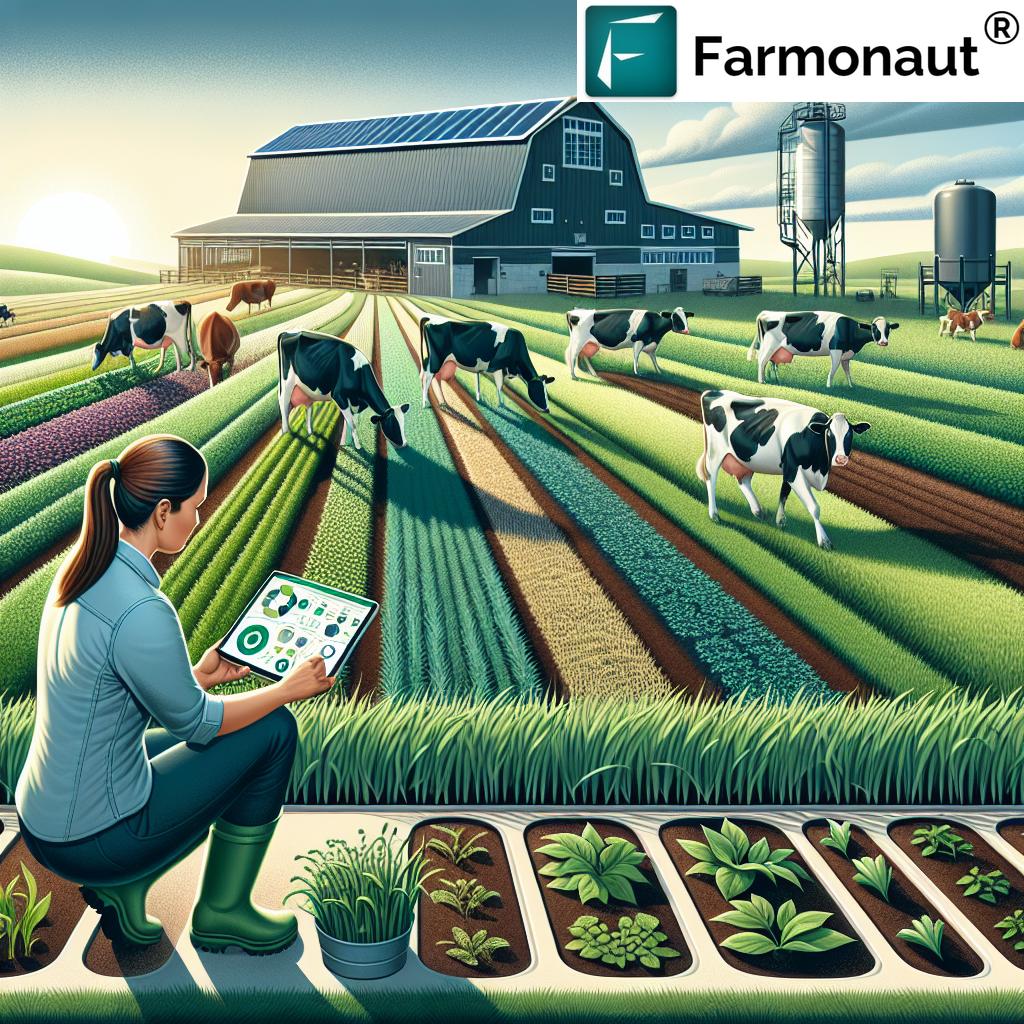Alberta Farmers Embrace Sustainable Agriculture: On-Farm Climate Action Fund Boosts Climate Change Mitigation Efforts
“Over 700 Alberta farmers applied for the On-Farm Climate Action Fund in 2022 for climate change mitigation projects.”
In the heart of Canada’s Prairie provinces, Alberta farmers are leading the charge in embracing sustainable agriculture practices. The On-Farm Climate Action Fund has become a catalyst for change, propelling the agricultural industry towards a greener, more sustainable future. As we delve into this transformative initiative, we’ll explore how Alberta’s farmers are not just adapting to climate change but actively working to mitigate its effects.
The On-Farm Climate Action Fund: A Game-Changer for Alberta Agriculture
The On-Farm Climate Action Fund represents a significant step forward in Canada’s commitment to sustainable farming practices. This program, which has garnered immense interest from Alberta’s agricultural community, supports a range of climate-positive initiatives. From precision agriculture technology to soil health management, the fund covers up to 85% of project costs, making it an attractive proposition for farmers looking to innovate and reduce their environmental impact.

The overwhelming response to this program, with over 700 applications submitted in 2022 alone, underscores the agricultural sector’s commitment to sustainable practices. This surge in interest not only highlights the growing awareness among farmers about the need for climate change mitigation but also demonstrates their willingness to adopt innovative solutions.
Key Focus Areas of the On-Farm Climate Action Fund
The fund targets several crucial areas that have the potential to significantly reduce greenhouse gas emissions and improve overall farm sustainability:
- Nitrogen Management Techniques: Optimizing nitrogen use to reduce emissions and improve soil health.
- Rotational Grazing Benefits: Implementing grazing systems that enhance pasture productivity and carbon sequestration.
- Cover Cropping Methods: Utilizing cover crops to protect and enrich soil between growing seasons.
- Irrigation Management: Improving water use efficiency to conserve resources and reduce energy consumption.
- Agricultural Machinery Efficiency: Upgrading to more fuel-efficient and environmentally friendly farm equipment.
These focus areas align perfectly with the global push towards sustainable agriculture and climate change mitigation in farming. By addressing these key aspects, Alberta farmers are not only reducing their carbon footprint but also improving the long-term viability of their operations.
Precision Agriculture: The Future of Farming
One of the most exciting aspects of the On-Farm Climate Action Fund is its support for precision agriculture technology. This innovative approach to farming uses data-driven insights to optimize resource use, minimize waste, and maximize yields. By leveraging tools like satellite imagery, GPS-guided machinery, and advanced sensors, farmers can make more informed decisions about planting, fertilizing, and harvesting their crops.
At Farmonaut, we’re proud to be at the forefront of this technological revolution in agriculture. Our satellite-based farm management solutions provide real-time crop health monitoring, enabling farmers to make data-driven decisions that benefit both their bottom line and the environment.
By integrating precision agriculture technology, Alberta farmers can:
- Reduce overuse of fertilizers and pesticides
- Optimize irrigation to conserve water
- Minimize soil compaction through targeted machinery use
- Increase crop yields while reducing environmental impact
Soil Health Management: The Foundation of Sustainable Agriculture
Soil health is a critical component of sustainable agriculture, and the On-Farm Climate Action Fund recognizes its importance. By promoting practices that enhance soil health, the program is helping Alberta farmers build the foundation for long-term agricultural sustainability.
“The On-Farm Climate Action Fund covers up to 85% of project costs for sustainable agriculture practices in Alberta.”
Key soil health management practices supported by the fund include:
- Cover Cropping: Planting cover crops between growing seasons protects soil from erosion, improves soil structure, and increases organic matter content.
- Reduced Tillage: Minimizing soil disturbance helps maintain soil structure and preserve beneficial microorganisms.
- Crop Rotation: Diversifying crop sequences improves soil fertility and breaks pest and disease cycles.
- Organic Matter Management: Incorporating crop residues and organic amendments enhances soil fertility and water-holding capacity.
These practices not only improve soil health but also contribute significantly to carbon sequestration, making them powerful tools in the fight against climate change.
Nitrogen Management: Balancing Productivity and Sustainability
Nitrogen management is a critical aspect of sustainable agriculture, and it’s an area where Alberta farmers are making significant strides. The On-Farm Climate Action Fund supports various nitrogen management techniques that help reduce greenhouse gas emissions while maintaining or even improving crop yields.
Some of the key nitrogen management strategies include:
- Precision Application: Using GPS-guided machinery and variable rate technology to apply nitrogen fertilizer exactly where it’s needed.
- Split Applications: Applying nitrogen in smaller, more frequent doses to match crop uptake and reduce losses.
- Use of Nitrification Inhibitors: These compounds slow the conversion of ammonium to nitrate, reducing the risk of nitrogen leaching and denitrification.
- Enhanced Efficiency Fertilizers: These products release nitrogen slowly or in response to plant needs, improving nutrient use efficiency.
By implementing these techniques, Alberta farmers are not only reducing their environmental impact but also optimizing their fertilizer use, leading to potential cost savings and improved profitability.
Rotational Grazing: A Win-Win for Livestock and the Environment
For Alberta’s livestock producers, rotational grazing has emerged as a key strategy for sustainable land management. This practice involves dividing pastures into smaller paddocks and moving livestock between them in a planned sequence. The On-Farm Climate Action Fund’s support for rotational grazing is helping farmers reap numerous benefits:
- Improved Pasture Health: By allowing grass to rest and regrow between grazing periods, rotational grazing promotes healthier, more productive pastures.
- Enhanced Soil Carbon Sequestration: Well-managed grasslands can store significant amounts of carbon in their root systems and soil.
- Increased Biodiversity: Rotational grazing creates a mosaic of habitat types, supporting a wider range of plant and animal species.
- Better Livestock Health: Access to fresh, high-quality forage can improve animal health and productivity.
Through the implementation of rotational grazing, Alberta’s ranchers are demonstrating that livestock production can be part of the solution to climate change.

Cover Cropping: Building Soil Health and Resilience
Cover cropping is another sustainable agriculture practice gaining traction among Alberta farmers, thanks in part to the support provided by the On-Farm Climate Action Fund. Cover crops are planted between main crop seasons or alongside cash crops to provide numerous benefits:
- Soil Protection: Cover crops shield the soil from wind and water erosion during fallow periods.
- Nutrient Cycling: They capture and recycle nutrients that might otherwise be lost to leaching or runoff.
- Weed Suppression: Dense cover crop stands can help suppress weed growth, reducing the need for herbicides.
- Carbon Sequestration: Cover crops contribute to building soil organic matter, which helps store carbon in the soil.
- Water Management: They improve soil structure and water infiltration, enhancing the soil’s ability to retain moisture.
By incorporating cover crops into their rotations, Alberta farmers are not only improving their soil health but also contributing to climate change mitigation efforts.
Irrigation Management: Conserving Water and Energy
In the semi-arid regions of Alberta, efficient irrigation management is crucial for sustainable agriculture. The On-Farm Climate Action Fund is supporting farmers in adopting advanced irrigation technologies and practices that conserve water and reduce energy consumption. These include:
- Precision Irrigation Systems: Using sensors and weather data to apply water precisely when and where it’s needed.
- Low-Pressure Sprinklers: These systems reduce energy use and water loss through evaporation.
- Drip Irrigation: Highly efficient systems that deliver water directly to plant roots.
- Irrigation Scheduling: Using soil moisture monitoring and crop water use data to optimize irrigation timing.
By improving irrigation efficiency, Alberta farmers are not only conserving precious water resources but also reducing the energy required for pumping, thereby lowering greenhouse gas emissions.
Agricultural Machinery Efficiency: Reducing Emissions Through Technology
The On-Farm Climate Action Fund also supports improvements in agricultural machinery efficiency, recognizing the significant role that farm equipment plays in overall emissions. Alberta farmers are investing in:
- Fuel-Efficient Tractors and Combines: Modern machines with improved engine technology and reduced fuel consumption.
- GPS-Guided Equipment: Reduces overlap and unnecessary passes, saving fuel and reducing soil compaction.
- Electric and Hybrid Machinery: As technology advances, more electric options are becoming available for farm use.
- Regular Maintenance and Upgrades: Keeping machinery in top condition ensures optimal efficiency and reduced emissions.
By upgrading to more efficient machinery, farmers are not only reducing their carbon footprint but also often seeing cost savings through reduced fuel consumption.
The Role of Technology in Sustainable Agriculture
As we’ve seen, technology plays a crucial role in many of the sustainable agriculture practices supported by the On-Farm Climate Action Fund. From precision agriculture to efficient irrigation systems, technological innovations are helping Alberta farmers reduce their environmental impact while maintaining or improving productivity.
At Farmonaut, we’re proud to contribute to this technological revolution in agriculture. Our satellite-based crop monitoring system provides farmers with valuable insights into crop health, soil moisture, and potential pest or disease issues. This information allows for more targeted interventions, reducing the need for blanket applications of fertilizers or pesticides.
Our technology aligns perfectly with the goals of the On-Farm Climate Action Fund, helping farmers make data-driven decisions that benefit both their operations and the environment. By leveraging satellite imagery and advanced analytics, we’re empowering farmers to practice precision agriculture at scale.
Education and Outreach: Spreading Sustainable Practices
An essential component of the On-Farm Climate Action Fund’s success is its focus on education and outreach. As the program continues, more field days and demonstrations are planned to educate farmers on climate-positive practices. These events provide invaluable opportunities for farmers to:
- Learn about the latest sustainable agriculture techniques
- See real-world examples of successful implementation
- Network with other farmers and share experiences
- Consult with agricultural experts and researchers
By fostering a community of knowledge-sharing and continuous learning, the program ensures that sustainable practices are not just adopted but refined and improved over time.
The Future of Sustainable Agriculture in Alberta
As the On-Farm Climate Action Fund continues to support innovative projects, Alberta’s agricultural industry is poised for significant advancements in sustainable farming. The program’s success has already paved the way for future application rounds, ensuring that more farmers can benefit from this transformative initiative.
Looking ahead, we can expect to see:
- Increased adoption of precision agriculture technologies
- Further refinement of soil health management practices
- Expansion of rotational grazing systems
- Wider implementation of cover cropping strategies
- Continued improvements in irrigation and machinery efficiency
These advancements will not only help Alberta farmers reduce their environmental impact but also improve their resilience to climate change, ensuring a sustainable future for agriculture in the province.
Climate Change Mitigation Practices Supported by On-Farm Climate Action Fund in Alberta
| Practice | Description | Estimated Cost Covered (%) | Potential Environmental Benefits |
|---|---|---|---|
| Precision Agriculture Technology | Use of GPS, sensors, and data analytics for targeted farming practices | Up to 85% | Reduced input use, minimized soil compaction, increased efficiency |
| Nitrogen Management | Optimized application of nitrogen fertilizers | Up to 85% | Reduced greenhouse gas emissions, improved water quality |
| Rotational Grazing | Planned movement of livestock between pasture areas | Up to 85% | Enhanced soil carbon sequestration, improved biodiversity |
| Cover Cropping | Planting crops to cover soil between growing seasons | Up to 85% | Reduced soil erosion, improved soil health, increased carbon storage |
| Irrigation Management | Efficient water application techniques and technologies | Up to 85% | Water conservation, reduced energy use, minimized runoff |
| Agricultural Machinery Efficiency | Upgrading to more fuel-efficient and precise farm equipment | Up to 85% | Reduced fuel consumption, lower emissions, minimized soil disturbance |
The Global Impact of Alberta’s Sustainable Agriculture Initiatives
The efforts of Alberta farmers in embracing sustainable agriculture practices have implications that extend far beyond the province’s borders. As a major agricultural producer, Alberta’s shift towards more sustainable farming methods can have a significant impact on global food systems and climate change mitigation efforts.
Some of the global impacts include:
- Setting an Example: Alberta’s success in implementing sustainable practices can serve as a model for other agricultural regions around the world.
- Research and Innovation: The knowledge gained from these initiatives contributes to the global body of research on sustainable agriculture.
- Market Influence: As consumers increasingly demand sustainably produced food, Alberta’s farmers are well-positioned to meet this growing market need.
- Climate Change Mitigation: The cumulative effect of these practices contributes to global efforts to reduce agricultural greenhouse gas emissions.
By leading the way in sustainable agriculture, Alberta is not just securing its own agricultural future but also contributing to global food security and environmental sustainability.
Conclusion: A Sustainable Future for Alberta Agriculture
The On-Farm Climate Action Fund has ignited a transformation in Alberta’s agricultural sector, propelling farmers towards more sustainable and climate-friendly practices. From precision agriculture and soil health management to innovative grazing and cropping strategies, Alberta farmers are embracing a wide range of techniques to reduce their environmental impact while maintaining productivity.
As we look to the future, it’s clear that sustainable agriculture will play a crucial role in addressing the challenges of climate change and food security. Alberta’s farmers, armed with the support of programs like the On-Farm Climate Action Fund and innovative technologies, are well-positioned to lead this charge.
At Farmonaut, we’re excited to be part of this agricultural revolution, providing farmers with the tools and insights they need to make informed, sustainable decisions. Together, we can build a more resilient, productive, and environmentally friendly agricultural sector that will benefit generations to come.
Frequently Asked Questions (FAQ)
- What is the On-Farm Climate Action Fund?
The On-Farm Climate Action Fund is a program that supports Alberta farmers in implementing sustainable agriculture practices and climate change mitigation projects. It covers up to 85% of project costs for eligible initiatives. - What types of projects does the fund support?
The fund supports projects related to precision agriculture technology, soil health management, nitrogen management, rotational grazing, cover cropping, irrigation management, and agricultural machinery efficiency. - How can Alberta farmers apply for the On-Farm Climate Action Fund?
Farmers can apply for the fund during open application periods. It’s recommended to check with the Alberta Agriculture and Forestry department or visit their official website for the most up-to-date information on application procedures and deadlines. - What are the benefits of sustainable agriculture practices for farmers?
Sustainable agriculture practices can lead to improved soil health, reduced input costs, increased resilience to climate change, better water management, and potentially higher crop yields. They also contribute to long-term farm sustainability and may open up new market opportunities. - How does precision agriculture technology help in climate change mitigation?
Precision agriculture technology helps farmers optimize their use of inputs like fertilizers and pesticides, reducing waste and minimizing environmental impact. It also allows for more efficient use of resources, leading to reduced greenhouse gas emissions. - What role does Farmonaut play in sustainable agriculture?
Farmonaut provides satellite-based farm management solutions that support precision agriculture practices. Our technology helps farmers monitor crop health, manage resources efficiently, and make data-driven decisions that contribute to sustainable farming practices.
For more information on how Farmonaut can support your sustainable agriculture efforts, visit our API page or check out our API Developer Docs.
















